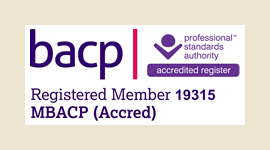

![]() I can offer Zoom video counselling sessions both nationally and internationally.
I can offer Zoom video counselling sessions both nationally and internationally.
Alan Neeld MBACP (Accred) is a qualified Counsellor / Psychotherapist and an accredited member of the BACP (British Association for Counselling and Psychotherapy) and UKRCP (United Kingdom Register of Counsellors and Psychotherapists).
Alan volunteers at Marie Curie in Solihull as a way to give back. Find out more
here ![]()

Anxiety
Everybody experiences anxiety from time to time; in fact about 1
person in 20 in the UK suffers from severe anxiety of some kind.
It generally
occurs when people feel frightened or threatened by something,
for example, going to the dentist, hospital, job interview, exam
or a
first date.
Sometimes the cause of anxiety is obvious and other times it can
seem to not relate to any clear cause. When the cause is not evident,
it
can often be the cumulative result of many smaller stresses having
built up over time or perhaps the result of a previous anxiety provoking
experience that the person felt traumatised by and has not dealt with.
As with stress, there are times when a certain amount of short term or mild anxiety can be helpful in motivating a person to perform to their best or to get things done. Severe anxiety however, can feel overwhelming and can have a debilitating and paralysing effect, preventing them from living the way they want to and enjoying themselves.
There are many causes of anxiety.
If something frightening happened in a particular situation earlier in a person's life and they were not able to effectively deal with their feelings or resolve the situation, they may get anxious about being in a similar situation again.
Anxiety can be learnt. If a person grew up in a family that tended to see the world as a dangerous and frightening place or where the parents were themselves anxious, then these attitudes and traits can easily be passed onto the next generation.
A person might be faced with something that is out of their control, for example, developing a serious or life threatening illness, losing their job, a relationship breakdown or being attacked.
Other factors that can lead to feeling anxious include: stress, exhaustion, poor diet, caffeine, cigarettes, alcohol, use of recreational drugs and the side effects of prescribed medication.
Sometimes a person can experience periods of anxiety that will keep recurring over a long period of time. When this happens they can feel powerless, begin to dread its return and become anxious about getting anxious. This then becomes a vicious cycle whereby each period of anxiety provokes the emergence of the next.
Symptoms of anxiety include:
| Avoiding difficult situations | Fear of having a heart attack | Worrying | Fear of going crazy | Apprehension | Feeling faint or dizzy | Being irritable | Shaking or trembling | Fear of impending death | Unrealistic appraisal of danger | Feeling of choking | Being easily startled | Palpitations | Difficulty sleeping |
| Sweating | Feeling sick |
| Chest pains | Panic attacks |
| Breathlessness | Rapid or shallow breathing |
Some of the more common issues Alan works with are:-
Stress ![]()
Depression ![]()
Anxiety ![]()
Self Esteem ![]()
Bereavement ![]()
Relationship Issues ![]()
Alan also works with many other issues such as self harm, grief and bereavement, anger issues, abuse and sexual problems.
Please contact Alan ![]() if you have any questions or to book an appointment.
if you have any questions or to book an appointment.
